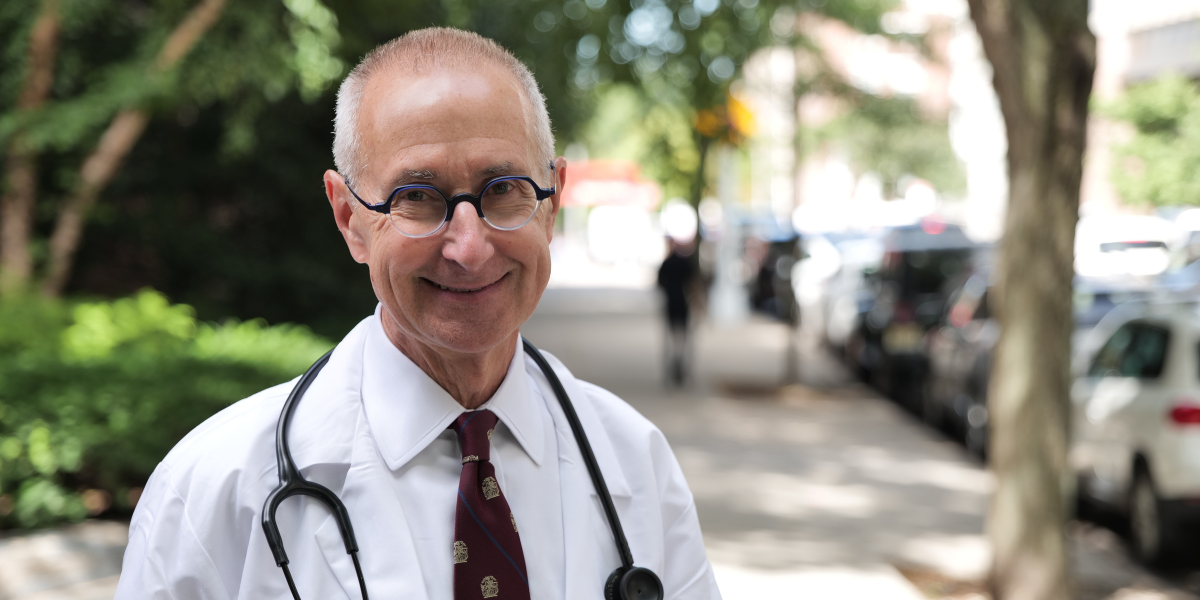As chair of the St. George’s University Department of Surgery, James Rucinski, MD, FACS, FACEP, nurtures talent and growth of SGU clinical students at NewYork-Presbyterian Brooklyn Methodist Hospital.
“Medical students are practically oriented, highly intelligent, and multi-dimensional. Working with medical students gives me the opportunity to learn about our professional interests as well as the rest of life.” —Dr. Rucinski
In his role, Dr. Rucinski holds three primary responsibilities: supervising the clinical practice of the faculty, overseeing faculty scholarly activity, and managing the department’s educational programs. At a medical school with multiple clinical education sites, he directly supervises clinical education to ensure consistent curricula and processes. He also ensures equitable distribution of resources and comparable learning experiences for students across all clinical sites, reinforcing his commitment to high-quality surgical education.
As a physician who treats patients, his clinical practice spans a broad spectrum of surgical care, including acute care and breast surgery, reflecting the same commitment to excellence and mentorship that defines his educational leadership.
His passion for teaching is rooted in a broader love for surgery itself. When asked what draws him to the field, he explained, “Clinical surgery allows one to develop and maintain human relationships that are built around helping people overcome difficult and life-changing problems.”
In addition to his teaching, Dr. Rucinski is a fellow of the American College of Surgeons and has held numerous leadership roles in national and regional surgical societies. His positions include president of several prestigious organizations, cancer liaison physician, and surgeon champion for quality improvement programs at NewYork-Presbyterian Brooklyn Methodist Hospital.
Dr. Rucinski shared with SGU News more about his role, his goals for clinical education, and advising for incoming and current clinical students.
SGU: What does a typical day look like for a student on a surgery rotation?
Dr. Rucinski: General surgery and its closest subspecialties provide the focus for 8 of the 12 weeks of the surgery rotation. In general surgery, students immerse themselves in the life of a teaching hospital’s surgery department alongside residents. Each day the student actively participates in morning and evening inpatient service rounds as well as observing and assisting in the operating room.
Active participation in outpatient surgical care is also part of the rotation. Students’ experiences differ from residents’ because they follow a parallel curriculum with dedicated study time. The remaining four weeks of the 12 weeks provide flexible experiences in surgery subspecialties such as surgical critical care, anesthesiology, orthopedic surgery, urology, and other subspecialty disciplines, both inpatient and outpatient.
SGU: How do students participate in actual operations during their surgery rotation?
Dr. Rucinski: Students are active participants in the operating room during their surgery rotation. The student’s role is primarily as an observer, but an observer with a seat in the front row. The student prepares and participates in each operation at the operating table dressed in the same sterile attire as the other members of the team.
Although most of the student’s activity is spent watching, questioning and answering questions, there are many key contributions that they make in every operation. Students may participate by retracting tissue to improve visibility, cutting secured sutures, and closing superficial layers such as the skin. In minimally invasive procedures, students often operate the fiberoptic camera to display the surgical site.
SGU: What are some key lessons students should learn during their surgery rotation?
Dr. Rucinski: Surgery manages disease using physiologic principles, whether or not an operation is required. A key lesson that students learn is that surgical treatment may not just be operative or non-operative but may involve a combination of various medical interventions.
SGU: What attributes make a good surgeon?
Dr. Rucinski: There are two main characteristics that are found in a good surgeon. The first is a conscientious, detail-oriented approach in both life and work, with a positive attitude toward any task. The second is resilience by recognizing that even the most advanced surgeon may be called on to perform the most basic tasks.
SGU: Do you see patients? What type of surgical care do you focus on?
Dr. Rucinski: Yes, I see patients. Clinical surgical teaching can only be done effectively if one is “on the ground” with the learners.
Surgical practice for me covers a broad range of general surgery, including procedures on the gastrointestinal tract, endocrine glands, blood vessels, and certain cancers such as breast cancer. I stay overnight in the hospital five days a month as the leader of the team that cares for surgical emergencies and trauma.
SGU: What advice would you give incoming clinical students to be successful in the clinical years?
Dr. Rucinski: To be successful in the clinical years, students must be mentally and physically present. They must be flexible and industrious with a well-developed approach to time management.
SGU: What should clinical students know if applying for surgery residency?
Dr. Rucinski: Approach your surgical residency application by collaborating with fellow students interested in surgery through the school’s established interest group. Additionally, work closely with the Office of Career Guidance for guidance and support.


